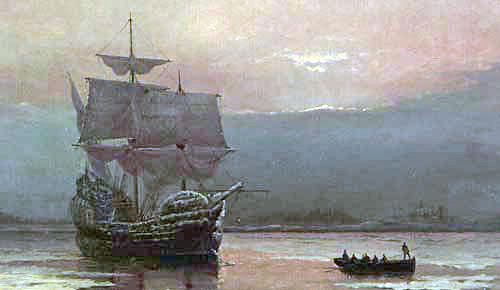Mayflower DNA Project
IMPORTANT: Read me First
This Project utilizes Y-DNA and mtDNA. It does NOT utilize autosomal DNA (such as 23andMe and Ancestry DNA). You can view a video about Y-DNA and mtDNA at: https://www.facebook.com/groups/geneticgenealogytipsandtechniques/permalink/1838684253261933/
Project dashboard
- About the project
- Y-DNA and mtDNA Primer
- How you can help
- DNA sample collection tips
- Participant consent
- Results:
- Testing Options:
Methodology
The focus of this project is on using advanced Y-DNA and mtDNA tests to document the patrilineal (all male line) and matrilineal (all female line) lineages from the Mayflower passengers, their spouses, and the spouses of their children and grandchildren. For each surviving lineage this will provide the most comprehensive Y-DNA and mtDNA profile possible with current commercial genetic testing technology. When available, we will make use of prior genetic genealogy research related to these lineages (e.g. Y-STR test results) to provide supporting evidence and to guide project recruitment. Ideally, the initial goal is to obtain Y-DNA results from two different sons of the immigrant and mtDNA results from two different daughters of the immigrant. Once that is accomplished, the next goal would be to obtain multiple NGS/WGS Y-DNA results to define branches within the Y-DNA family. These branches are the key for folks who cannot document their "paper trail" back to the immigrant ancestor, but whose Y-DNA results indicate they must descend from a Mayflower passenger. It is hoped the General Society of Mayflower Descendants will allow this type of Y-DNA SNP information to become acceptable proof of descent. Another step would be to work with DNA testing companies to make individual Y-DNA SNPs delineating Mayflower lines available for a la carte and package testing.
Through this approach, we aim to achieve the following objectives:
- Place the Mayflower passengers into the broader human Y chromosome tree by determining high-resolution haplogroups for individual paternal lineages
- this can help provide a demographic-level picture of the ancestral origins of the groups comprising the 1620 Mayflower voyage
- these efforts will also likely aid in more general research of the human Y tree
- Identify unique, stable genetic markers for individual paternal lineages
- in many cases, it may be possible to identify one or two markers that confirm patrilineal descent from a single individual from the Mayflower as well as markers unique to certain branches of the family since their arrival
- Use the results to aid in genealogical research associated with the Mayflower passengers and crew, including tracing ancestry further back within England, Holland, etc.
- testing related lineages that stayed in Europe can be particularly helpful here
Contact us
References and External links
- Roser, Susan E., Mayflower Passenger References: from contemporary records and scholarly journals Stewart Publishing, Canada Second edition 2015
- Anderson, Robert Charles, The Mayflower Migration: Immigrants to Plymouth, 1620 New England Historic Genealogical Society, Boston, MA 2020
- Caleb Johnson's MayflowerHistory.com and Mayflower Passenger list
- Mayflower 400 Passenger List: an interactive guide
- American Ancestors 2020 Mayflower Passengers and Crew
- wikipedia List of Mayflower passengers
- International Society of Genetic Genealogy wiki
- General Society of Mayflower Descendants
- Guide to the Silver Books
- "Mayflower" article on Wikipedia
- Family Tree DNA (FTDNA) & General Society of Mayflower Descendants Mayflower DNA Project
- Y-SEQ Mayflower Group
- Geni.com Mayflower Passengers
© 2015-2024 mayflowerdna.org All Rights Reserved
